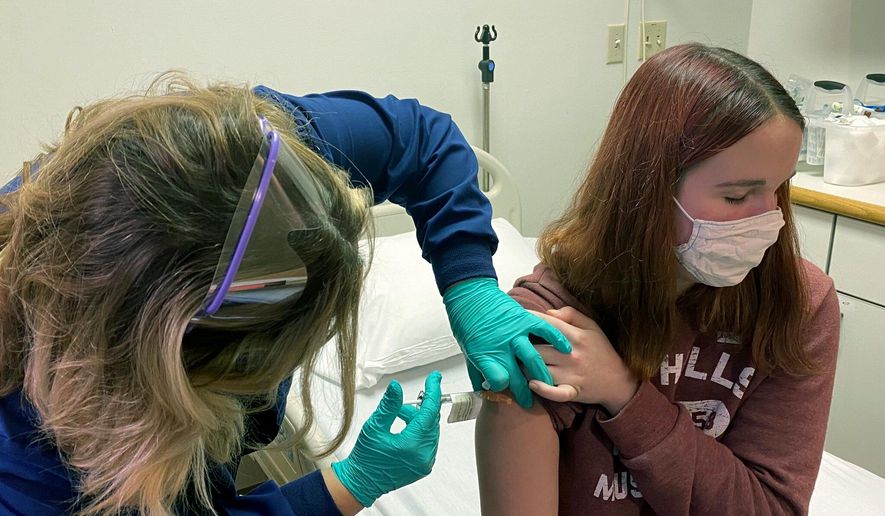A coronavirus vaccine from Pfizer proved 90% effective in early results, thrilling Wall Street and offering the world a dose of optimism at a critical point in the fight against the pandemic.
The New York company said the remarkable findings were based on its examination of 94 infections within the vaccine and placebo arms of its study of 40,000 participants.
Pfizer and German partner BioNTech will continue to count cases and form a final analysis, though the interim results suggest Pfizer is on track to request emergency approval from federal regulators this month.
“Today is a great day for science and humanity. The first set of results from our phase 3 COVID-19 vaccine trial provides the initial evidence of our vaccine’s ability to prevent COVID-19,” said Pfizer Chairman and CEO Albert Bourla.
The news reverberated around the country and sent stocks soaring, as investors seized on the development as a sign of better days ahead. The U.S. is recording more than 100,000 new infections per day and passed 10 million cases on Monday, signaling a difficult winter unless things turn around.
“We are reaching this critical milestone in our vaccine development program at a time when the world needs it most with infection rates setting new records, hospitals nearing overcapacity and economies struggling to reopen,” Dr. Bourla said.
However, Pfizer’s news does not mean a vaccine will be widely available to the public anytime soon.
The Food and Drug Administration wants two months of safety data from half of the trial participants after their second dose, pushing the company’s request for emergency approval to the latter half of November or early December. Health and frontline workers are expected to receive the first doses, followed by older adults and other vulnerable groups.
Vaccination of the broader public should last well into the spring.
President Trump had openly suggested a vaccine might arrive before Election Day, but that didn’t happen. His administration likely will oversee the launch of the immunization campaign, but not its conclusion.
Mr. Trump, who is contesting the official results of the election, took a victory lap in the morning, citing the surging stock market.
He turned bitter by evening, accusing the FDA and Pfizer of acting too late.
Federal regulators and “the Democrats didn’t want to have me get a Vaccine WIN, prior to the election, so instead it came out five days later – As I’ve said all along!” he tweeted.
At the same time, he said the vaccine will be approved far faster than if Mr. Biden faced similar circumstances.
Vice President Mike Pence tweeted that it was “huge news” and a credit to the “public-private partnership” forged by Mr. Trump, whose Operation Warp Speed has doled out $10 billion to put the vaccine process on a record-setting pace.
Pfizer did not accept federal funding for the research and development of its candidate. However, the administration in July placed an initial order with Pfizer — worth nearly $2 billion — for 100 million doses, with the option to acquire up to 500 million additional doses. The agreement would take effect once the FDA grants emergency authorization of the vaccine.
Later Monday, Health Secretary Alex Azar hailed the FDA’s decision to authorize an antibody treatment from Eli Lilly and Co. as another win for the sweeping operation.
Mr. Trump received a similar “antibody cocktail” from a separate company, Regeneron Pharmaceuticals. These drugs will help doctors treat patients as the world waits for the vaccine rollout.
“Operation Warp Speed is helping to ensure that therapeutics like Lilly’s can reach patients without a day wasted,” Mr. Azar said.
Presumptive President-elect Joseph R. Biden said the development is “excellent news” but warned that a sufficient share of the U.S. population will not be vaccinated until deep into 2021, so people shouldn’t start throwing their masks away.
“I congratulate the brilliant women and men who helped produce this breakthrough and to give us such cause for hope,” Mr. Biden said. “At the same time, it is also important to understand that the end of the battle against COVID-19 is still months away.”
Scientists also said the announcement offered little in the way of detail. They want to hear more.
“It’s only a company press release. No data, no information on protecting against serious illness, no information about durability or length of protection,” said Peter Hotez, dean of the National School of Tropical Medicine at the Baylor College of Medicine.
Paul Offit, a pediatrics professor at the University of Pennsylvania and member of the FDA’s vaccine advisory panel, said the results suggest high efficacy in staving off mild to moderate disease and provides support for the “messenger RNA” platform being used by companies such as Pfizer and Moderna.
“It validates the concept, most of all,” he said, though he cautioned Pfizer’s results may or may not translate into success elsewhere. “I’ve been in this business long enough not to make predictions” Pfizer and BioNTech are among several front-runners in the global chase for a vaccine that can bring the coronavirus down to manageable levels.
Johnson & Johnson, Moderna and AstraZeneca are in late-stage trials, giving the U.S. a few promising candidates.
Pfizer says it expects to be able to produce up to 50 million doses by the end of 2020 and up to 1.3 billion doses in 2021. The candidate is a two-dose vaccine, so the initial allotment translates to 25 million recipients.
Getting a vaccine approved is only part of the battle. Federal and state officials are trying to set up the logistics of getting shots from the freezers to arms across the country in the coming months. The administration says vaccines are being manufactured before receiving regulatory approval, so they are ready to go once the FDA gives the green light.
Mr. Biden says states need more support for the effort. He is seeking $25 billion.
• Tom Howell Jr. can be reached at thowell@washingtontimes.com.




Please read our comment policy before commenting.